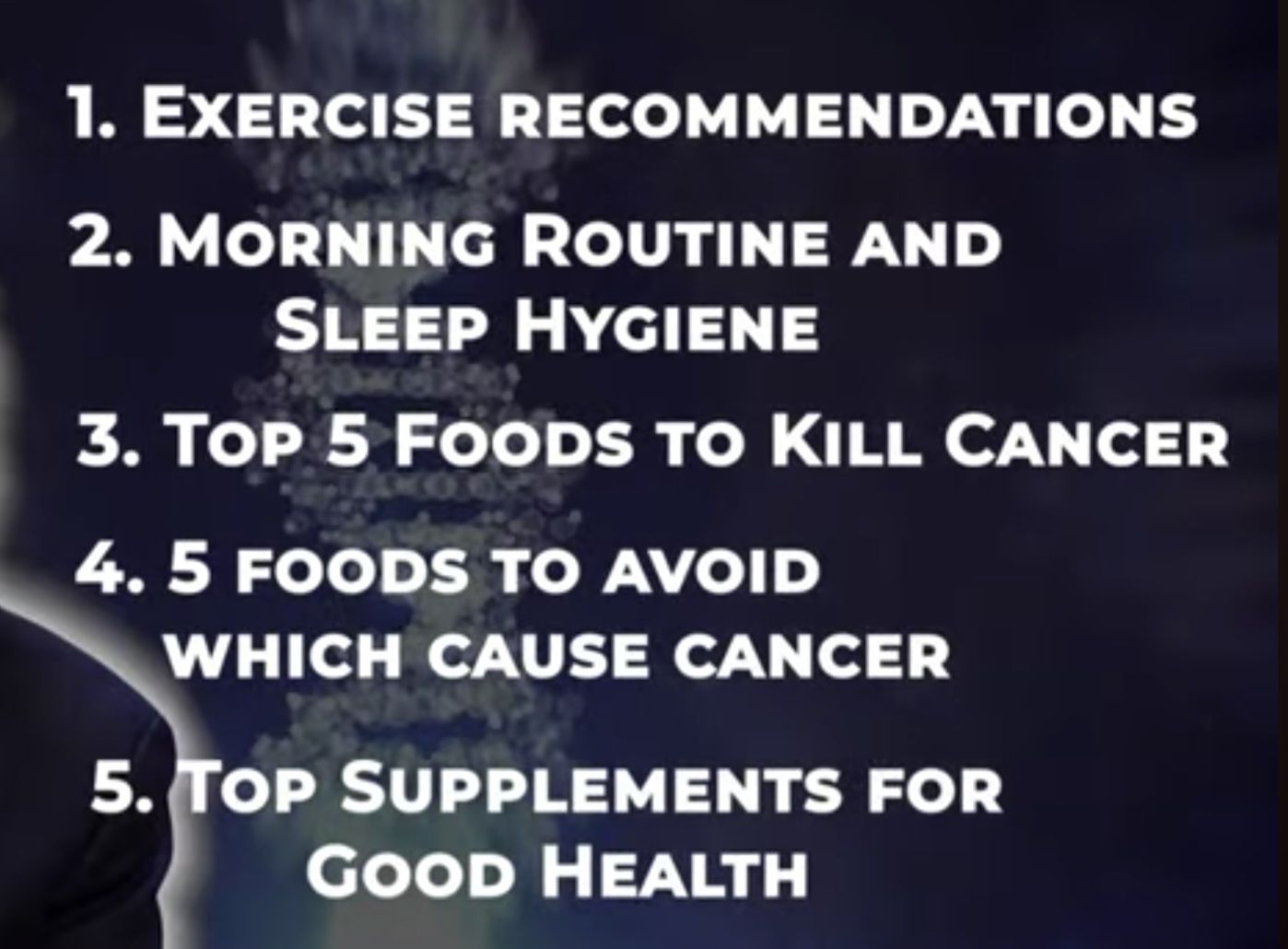What is it that Dr. Caldwell Esselstyn tells his patients to help them live long, healthy lives?
00:00 Dr. Esselstyn lifestyle solution for longevity
00:50 Dr. Esselstyn impressive career in medicine
01:45 Dr. Esselstyn Exercise routine for longevity
02:55 Dr. Esselstyn Diet recommendations for longevity
07:30 Dr. Esselstyn Daily breakfast for healthy heart
08:54 3 Supplements for longevity
After all, he is a 90-year-old renowned cardiologist, who has spent his entire career searching for the key to everlasting health and longer lifespan.
His advice has changed, saved and prolonged people’s lives.
For him, the secrets of health and longevity aren’t hidden in medicines.
Rather, it’s in making the right dietary and lifestyle choices.
Category: Motivational
100% Cancer Remission Achieved in ALL Patients in Groundbreaking Study
Prevent Alzheiemer’s – Avoid This!
Protect your brain through a healthy diet, exercise, mental stimulation, social interaction – and avoiding aluminum. Watch to learn what the aluminum industry would rather you not know. Consider using a silica-containing water or tea to help detox from past exposure.
Check out Dr. McDougall’s full article on aluminum and Alzheimer’s, at:
https://www.drmcdougall.com/education…
Also see:
https://www.nature.com/articles/s4159…
And see:
https://physiciansforinformedconsent….
Is THIS what’s causing mystery rise in colon cancers among young people? New research points to bacteria in the gut linked to processed food and not eating enough fiber
Scientists say they may be one step closer to understanding what’s driving a mystery rise in colon cancer in young people.
Researchers have discovered that patients with an aggressive form of the disease have unusually high levels of three bacteria in their guts.
Levels of fusobacterium, clostridium and shewanella have all been linked to diets high in processed foods and sugar, and low in fiber, fruit and veg.
Statins and Dementia, BRAIN Health (Lifesaving Information)
Note: your brain can also MAKE cholesterol. But, like creatine – which your body can MAKE – if you eat more (via red meat), your levels are increased. Some people seem to be confused about this basic principle.
The Microplastic Invasion: 12 Ways to Minimize Your Exposure
Microplastics have been linked to a myriad of chronic health conditions including:
Increasing evidence suggests that the toxicity of the endocrine-disrupting chemicals that microplastics are made from — e.g. BPA, phthalates and other toxic substances, that they absorb from the environment and concentrate — are enhanced by the size, shape and surface charge of the particles, as well as their abundance.
HOW TO REDUCE EXPOSURE
Ultimately, we’re not likely to be able to avoid it, so there’s little point worrying about every piece of plastic that we encounter, but we can take steps to reduce our exposure.
1. Think about your plastic usage and how you might be able to reduce it e.g. not using throw-away plastic items such as cutlery and straws.
2. Substitute single-use takeaway cups and bottles for your own stainless steel, bamboo or glass reusable cups and bottles.
3. Recycle plastic rubbish where possible and bin waste when you’re out.
4. Buy food packaged in glass or try out your local Fill Up shop where you can use your own containers over and over again.
5. Buy a good water filter to remove the microplastics. Reverse osmosis systems are our preferred option as they remove most of the particles, but also the vast majority of chlorine, hormones and fluoride.
6. Don’t heat food or liquid in plastic containers, particularly in microwaves, due to the number of particles released into your food.
7. When buying clothes, try to buy natural fabrics as opposed to synthetic fabrics, which shed plastic microfibres. Natural fibres can be more expensive so why not check out your local charity shop and do a bit of recycling at the same time?
8. Use a washing bag to reduce microplastic pollution when washing synthetic fabrics.
9. Air dry clothes rather than using a tumble dryer, which increases the production of microfibers.
10. Dust and vacuum (use a vacuum with a HEPA filter) regularly to reduce the accumulation of microplastics found in households.
11. Buy plastic-free cosmetics and personal care products. Check the labels for products containing plastic microbeads.
12. Ditch teabags and use organic, fairly traded loose-leaf with an infuser or old-fashioned teapot. Yep, you heard that right. Many tea bags contain plastic, which when heated can release billions of microplastics into your tea. Even so-called biodegradable tea bags, you know, the posh silky ones, are made from a type of genetically modified organism plastic and they’re not silk at all!
https://childrenshealthdefense.org/defender/microplastic-invasion-minimize-exposure/
Dr. Colin Campbell (90yo) “I Haven’t Been Sick in 47 Years”

What does 90-year old Dr. T Colin Campbell tell his patients to help them live long, healthy lives?
00:00 Dr. Campbell lifestyle solution for longevity
00:50 Dr. Campbell impressive career in medicine
01:23 Empowering Exercise Recommendations
02:52 Sleep & Morning routine for vitality
03:45 Dr. Campbell’s 5 Daily Foods For Longevity
09:13 5 Common Foods To Always Avoid
12:19 Dr. Campbell’s Supplements for a healthy heart
What about healthy oils?
Some oils might be healthier than others. Extra virgin olive oil, for instance, is applauded for having more antioxidants than regular olive oil. But does that mean it’s a health food? How do oils stack up against their whole food sources? Take 100 grams of olives versus 100 grams of olive oil.
Join the Food Revolution: 2024 Docuseries with Top Food Experts
Sign up to watch the BRAND
NEW 2024 Food Revolution
Summit Docuseries for FREE!
Premiering LIVE from April 24th –
May 1st, 2024 — Don’t Miss Out!
The Simple Key To Happiness: Hydration – Study Finds
A new survey suggests that staying hydrated might just be the key to unlocking more joy in your daily life.